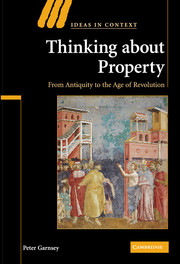Book contents
- Frontmatter
- Contents
- Abbreviations
- Preface
- Introduction
- Chapter 1 Plato's ‘communism’, Aristotle's critique and Proclus' response
- Chapter 2 Plato's ‘communism’: from late antiquity via Islamic Spain to the Renaissance
- Chapter 3 Renunciation and communality: thinking through the primitive Church
- Chapter 4 The poverty of Christ: crises of asceticism from the Pelagians to the Franciscans
- Chapter 5 The state of nature and the origin of private property: Hesiod to William of Ockham
- Chapter 6 The state of nature and the origin of private property: Grotius to Hegel
- Chapter 7 Property as a legal right
- Chapter 8 Property as a human right
- Conclusion
- Bibliography
- Index
Chapter 6 - The state of nature and the origin of private property: Grotius to Hegel
Published online by Cambridge University Press: 22 September 2009
- Frontmatter
- Contents
- Abbreviations
- Preface
- Introduction
- Chapter 1 Plato's ‘communism’, Aristotle's critique and Proclus' response
- Chapter 2 Plato's ‘communism’: from late antiquity via Islamic Spain to the Renaissance
- Chapter 3 Renunciation and communality: thinking through the primitive Church
- Chapter 4 The poverty of Christ: crises of asceticism from the Pelagians to the Franciscans
- Chapter 5 The state of nature and the origin of private property: Hesiod to William of Ockham
- Chapter 6 The state of nature and the origin of private property: Grotius to Hegel
- Chapter 7 Property as a legal right
- Chapter 8 Property as a human right
- Conclusion
- Bibliography
- Index
Summary
THE EARLY ENLIGHTENMENT
Hugo Grotius (1583–1645), Samuel Pufendorf (1632–94) and John Locke (1632–1704) all sought to give private property the status of natural law by locating its emergence in the state of nature. The problem they faced was that they were working within a tradition, stretching right back into antiquity, according to which the primeval condition was a form of communality in which all humanity had equal access to the resources of the earth. Moreover, late antiquity and the Middle Ages had produced a Christian reading of this tradition, by which the Christian God had ordered things in this way. Their response to the challenge was twofold. First, in order to counter the possible charge that mankind had thwarted God's purpose, they argued that the establishment of private property, while not a direct consequence of a dictate of God, was man's rational response to the divine command to use the resources of the world for his self-preservation and increase. Secondly, in order to justify the apparent breach of the principle of equal access to material resources, Grotius and Pufendorf proposed that agreement, tacit or express, must have preceded first occupatio; while for Locke the crucial step in the establishment of rights over unoccupied land was creative labour.
The contributions to property theory of these philosophers of the early Enlightenment should be seen as part of a wider concern with the great political issues of the time, domestic and international.
- Type
- Chapter
- Information
- Thinking about PropertyFrom Antiquity to the Age of Revolution, pp. 136 - 176Publisher: Cambridge University PressPrint publication year: 2007



